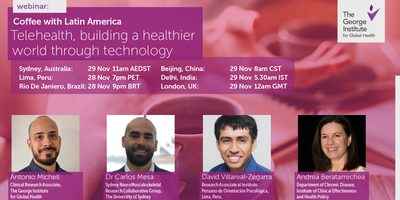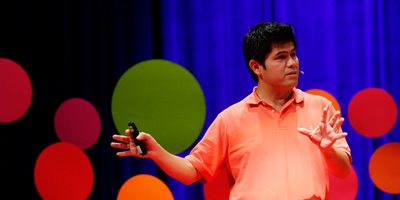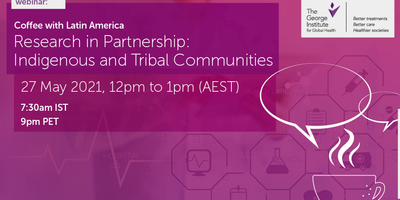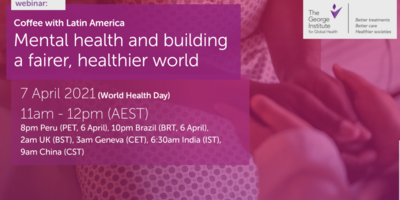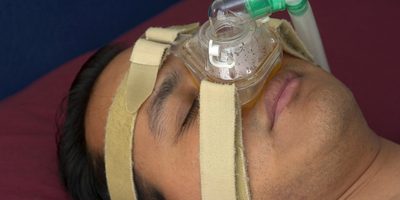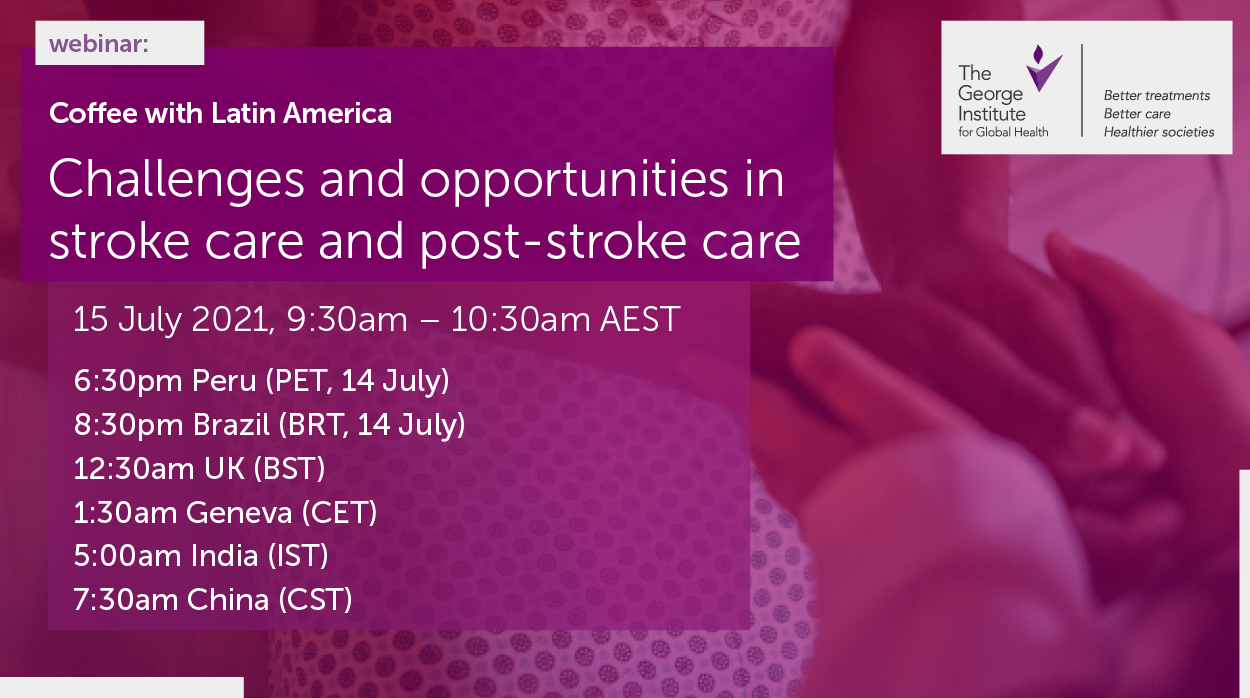
Reflections from Coffee with Latin America: Challenges and opportunities in stroke care and post stoke care
On 15 July 2021, The George Institute for Global Health hosted a ‘Coffee with Latin America' focusing on ‘Challenges and opportunities in stroke care and post stoke care’.
This informal-style webinar featured four presenters from different regions: Dr Paula Muñoz, Dr Jessica Zafra-Tanaka, Professor Richard I Lindley, and Professor Maree Hackett, sharing motivations and lessons learned from individual studies on different stages and aspect of stroke care, including the challenges of post-stroke care in low-income settings. Attendees tuned in from seven countries around the globe and were encouraged to establish connections for future work. The session was chaired by Dr Cheryl Carcel and Prof Jaime Miranda.
Across different regions, there is an urgent need for effective prevention and management strategies for people at risk of stroke, or who have experienced a stroke. We also need initiatives that go beyond the acute management of stroke and cater for stroke survivors long after their hospital stay. The rapidly increasing burden of stroke is presenting immense challenges in Latin America and many economies in transition, where prevention and management strategies are uneven and inadequate. Cross-regional collaborations can help overcome structural, funding and skill barriers affecting acute and long-term stroke care.
Key points from the presentations
Dr Paula Muñoz Venturelli presented on experiences from multi-regional stroke research collaborations featuring four trials (INTERACT2, INTERACT3, ENCHANTED, HEADPOST). She explained how this research had increased awareness of stroke among health professionals, improved local systems and pathways for stroke treatment, and provided data to inform local guideline recommendations. Challenges included attracting and retaining talented professionals, lack of local research infrastructure and organization, limited academic research funds, and few trained professionals in research. Paula observed that high-quality minimally-funded academic research can be conducted within busy clinical workloads and low-resourced health systems in Latin America. She concluded stroke is a key priority. She added that it is important to build an academic research network, and that more research, and better-quality research, should impact health outcomes positively.
Dr Jessica Zafra-Tanaka presented a study focusing on managing post-stroke care during the COVID-19 pandemic at a tertiary care hospital in Peru. As a background, Jessica noted stroke care is complex as it involves different settings and health care personnel; after discharge, patients need to continue treatment (rehabilitation, management of stroke risk factors, etc). In Perú, less than 50% of stroke patients returned to an outpatient consult one month after the stroke and only 30% completed rehabilitation treatment. Potential reasons include lack of familiarity with the health care system, not knowing what care they should follow after discharge, and a fragmented health care system. Despite challenges during the study, it found there was disruption in the continuity of stroke care, and there is a need to prioritize solutions that consider the perspectives of patients, caregivers, and health professionals. Next steps planned include co-creation of an intervention to improve communication between providers, and between patients and providers, and to explore the referral system and identify opportunities to improve it.
Professor Richard I Lindley presented on post-stroke rehabilitation in low- and middle-income countries. Three typical models in LMIC are family delivered rehabilitation, (single) health professional delivered rehabilitation and community centre based rehabilitation. Drawing on experiences from two trials that involved family delivered rehabilitation (ATTEND), and single health professional delivered rehabilitation (RECOVER), the presentation concluded that nurse coordinated rehabilitation had been shown to be ineffective, task-shifting healthcare in post-stroke rehabilitation has not yet been shown to be effective, and to improve rehabilitation options, consumer co-design was needed. Questions to explore include asking what do people in your community living after stroke need? How many people are affected? Would a centre-based rehabilitation design work best such as this one in Nigeria (http://strokeactionnigeria.com)?
Professor Maree Hackett presented on depression after stroke, and drew on studies which identified incidence, association factors, and treatment options. Drawing on 61 observational studies (12 population-based; 30 hospital-based, 19 rehabilitation-based) Maree noted depression first year after stroke ~1 in 3, and depression 2-5 years after stroke ~1 in 4. In terms of association factors Maree drew on data from 23 studies with 18,374 participants and identified people who developed depression also had associations of severe stroke, early physical disability, later mild/mod disability, later major disability. Maree continued to present findings from a Cochrane systematic review update of treatment of depression after stroke. We have evidence to show that antidepressants treat depression after stroke (8 trials including 1025 people) and reduce depressive symptoms, however they also increased adverse events (mainly central nervous system and gastrointestinal) – so we must carefully balance the benefits and risks before prescribing. Talking therapies also treated depression after stroke. Maree pointed out that only three of the 61 studies on the frequency of depression, and none of the trials in the Cochrane review, were conducted in Latin American countries.
Reflections from speakers
Cheryl: These Coffee with LatAm sessions brings together researchers from different parts of the world with a goal to improve health outcomes for all, and in this particular session for stroke survivors, I am fortunate to be involved and look forward to collaborating with our LatAm friends and colleagues to find innovative and low-cost solutions for every stroke survivor.
Jessica: Patients with stroke face different challenges to access care in LA. However, there is capacity and motivation to develop strategies and conduct research for the benefit of patients with stroke and their families. Let's find ways to collaborate with end-users of the health care services to improve them and let's keep strengthening collaborations in the region and beyond!
Paula: We can incorporate relevant changes in stroke patients' lives by generating new innovative solutions if we work together. Let's keep thinking about new research ideas, incorporating consumers' views and opinions, and take the available opportunities for collaboration to seek academic research funding to keep moving on!
Maree: There is a great desire and potential to work together to develop collaborative research that answers key questions related to stroke recovery and outcome. Finding novel, cost-effective interventions is key – as is finding ways to conduct funded stroke research in a pandemic that places an exceptionally high demand on already stretched healthcare services. If we work together with those with lived experience of stroke, perhaps we can make stroke recovery feel less a like a divorce, connect survivors rather than isolate them and help reduce any fears survivors may have interacting with academics and clinicians.
Jaime: Through the presentations we were able to disentangle the multiple challenges related post stroke care, particularly work disruptions in hospital-based care introduced by the COVID-19 pandemic. The narratives of the people who had survived a stroke and their caregivers are powerful, ranging from despair to abandonment. There are unique opportunities to bring together multidisciplinary teams to engage in co-creation of adequate person-centred interventions for this area, which goes alongside fostering collaborative research partnerships and capacity building.
Speakers
Dr Paula Muñoz Venturelli, MD PhD, Directora Centro de Estudios Clínicos ICIM, Facultad de Medicina, Clínica Alemana, Universidad del Desarrollo, Santiago, Chile, Honorary Senior Fellow, The George Institute for Global Health Conjoint Senior Lecturer, University of New South Wales
Dr Jessica Zafra-Tanaka, MD MSc, CRONICAS Center of Excellence in Chronic Diseases, Universidad Peruana Cayetano Heredia, Fogarty Global Health Fellow from the Northern Pacific Global Health Fellows program.
Professor Richard Lindley, Professorial Fellow, George Institute for Global Health, Professor of Geriatric Medicine, University of Sydney
Professor Maree Hackett, BA MA (Hons) PhD, Program Head, Mental Health, Professor, Faculty of Medicine, UNSW Sydney, Professor of Epidemiology, The University of Central Lancashire, United Kingdom
Chairs
Prof. J. Jaime Miranda, Visiting Professorial Fellow, The George Institute for Global Health; and Research Professor, Department of Medicine and Director, CRONICAS Centre of Excellence in Chronic Diseases, Universidad Peruana Cayetano Heredia, Peru.
Dr Cheryl Carcel, MD PhD, Senior Research Fellow, Stroke & Women's Health Program, Professorial Unit, Conjoint Senior Lecturer, Faculty of Medicine, UNSW Sydney, Associate Lecturer, Sydney Medical School, The University of Sydney
The Coffee with Latin America sessions brings together a few speakers in a relaxed style. These sessions are conducted in the spirit of knowledge sharing, exploring opportunities and challenges, or innovative ways of approaching research.
This series aims to facilitate global collaboration and learning and provide an opportunity for outreach and connection with the global health community. Input, questions, and thoughts are encouraged during the session or following.





